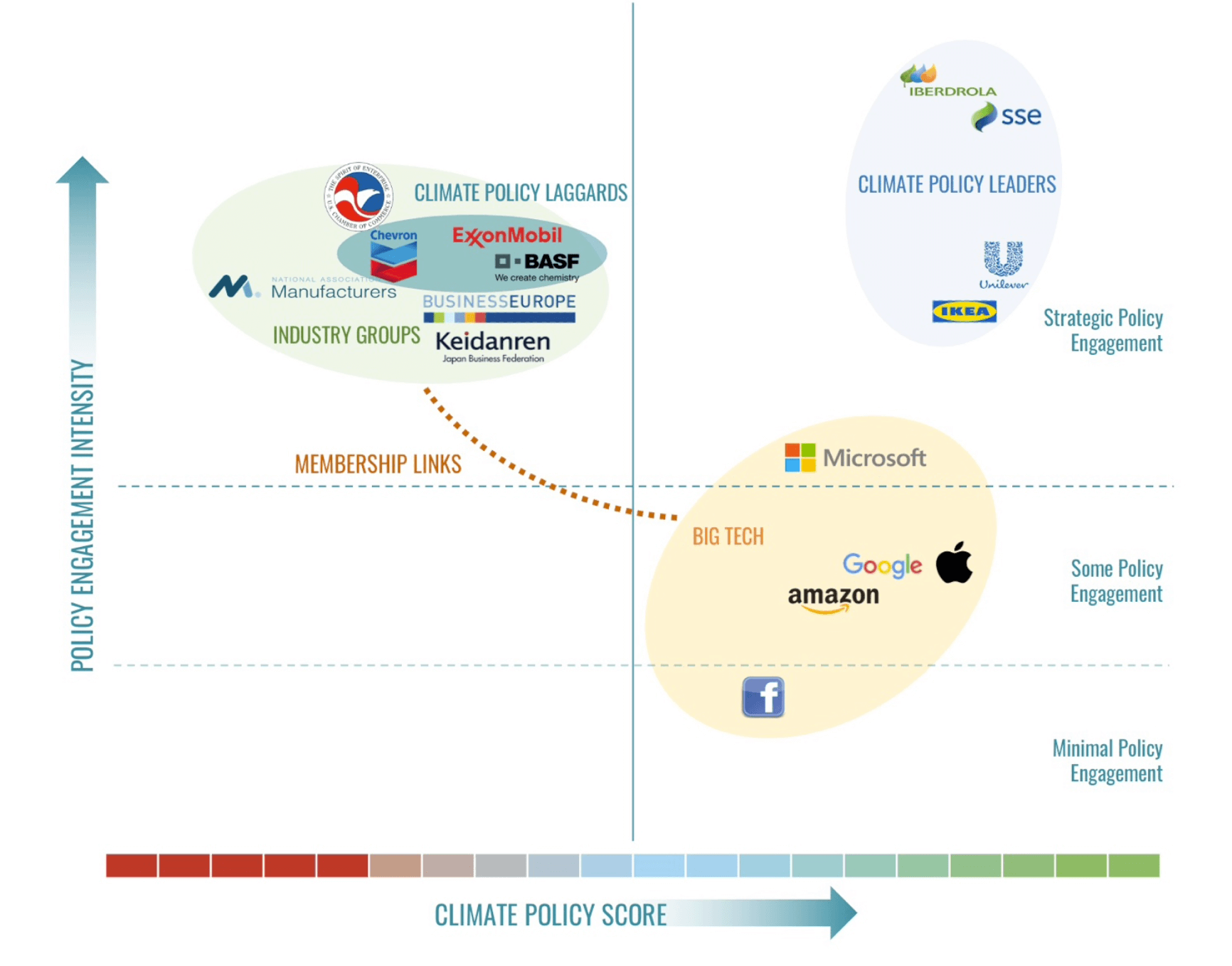In recent weeks, the new Biden Administration has brought a wave of activity around climate to Capitol Hill. It’s an exciting time, and for many of us who are deeply concerned about climate change, it feels like a long-awaited tipping point to finally transform big ideas into action. It’s also a great time to notice who is in the room advocating for change to meet the moment—and who’s missing the moment.
Big Tech is in a unique position to help propel pro-climate policy forward. While 2020 was a year of economic setbacks for many due to COVID-19, Big Tech flourished. Buoyed by the massive shift to online retail, remote work, and digital services as we weathered the pandemic, the combined revenue for the top five U.S. tech companies—Alphabet, Amazon, Facebook, Apple, and Microsoft—grew by 20%, to $1.1 trillion, while the rest of the economy struggled. Big Tech’s market cap expanded by about 50% since March, while the Dow Jones Industrial Average is up about 5%.
Big Tech’s climate commitments
Also in 2020, Big Tech proclaimed bold new sustainability commitments. Alphabet, Apple, and Microsoft announced industry-leading new targets (zero-carbon, carbon-neutral, and carbon-negative, respectively), and Facebook and Amazon released updates related to renewable energy procurement and electric mobility to build on existing commitments.
Facing enormous exposure to physical and transitional risks of climate change, it’s no surprise large corporations are taking steps to become more sustainable. These goals help to establish a brand of corporate leadership that will be essential for generating decarbonization at the scale and urgency needed to keep global temperature rise below 2°C. Big Tech, in particular, may have an advantage due to their dominant role in the global economy, their willingness to embrace disruptive innovation, and their ability to show it’s not only financially viable but actually advantageous to mitigate their carbon footprint.
Inadequate climate advocacy
While the climate crisis demands that solutions be rapidly scaled across the economy, the climate strategies Big Tech is leading with are limited to their own organizations. Big Tech has an important role to play in climate policy, but its influence has been notably absent on this front. This is a monumental omission in a global challenge that requires strong collective action. Excellent research and reporting over the past few weeks exposes the gap between Big Tech’s climate commitments and their political influence—both lobbying and campaign donations.
Let’s start with lobbying. InfluenceMap’s January 2021 report on Big Tech and Climate Policy compares the climate advocacy positions and spending of Big Tech and the climate obstructionists of Big Oil such as ExxonMobil and Chevron. Check out the Policy Engagement Intensity to see how far Big Tech has to step up its lobbying to counter Big Oil and make a dent in pro-climate advocacy.
 Source: InfluenceMap. (2021, January). Big Tech and Climate Policy.
Source: InfluenceMap. (2021, January). Big Tech and Climate Policy.
Looking at the related area of political donations, research from the climate journalism outlet HEATED shows further misalignment between Big Tech’s leading climate commitments and the candidates some have chosen to support. For example, Microsoft spent $200,000 in the 2020 election cycle to help elect politicians who are on record denying the science of climate change.
As these examples suggest, Big Tech’s climate commitments reveal little to no strategic direction around climate policy and advocacy. Without aligned leadership from these corporations on how to support climate legislation, Big Tech threatens to undercut its own hard work around decarbonization goals. This is an area where we urgently need to see Big Tech reposition its lobbying efforts to uphold its climate commitments.
Ongoing conversations
Fortunately, many organizations are working tirelessly to bring awareness to this gap, talk about why it’s important, and ensure Big Tech’s climate commitments include climate advocacy. One of them is ClimateVoice, a non-profit organization started by Bill Weihl, former head of sustainability at Google and Facebook (and Expert-in-Residence at PGS!).
Next week, he is launching the first episode of a new policy discussion show called “ClimateVoices with Bill Weihl,” where he’ll dive into these issues with special guests Senator Sheldon Whitehouse and InfluenceMap’s Kendra Haven—register for the event on Feb 16th at 1pm PT here. Each month, the series will feature diverse voices from government, media, business, activism, and nonprofits, illuminating opportunities for climate policy action and explaining why companies need to advocate for pro-climate legislation that ensures a just transition.
We’re at an important inflection point for climate action, where corporate commitments are gaining critical mass and we see a political opening to implement sweeping climate policy. As students in the only graduate program dedicated to sustainability and social justice, it is our responsibility to consider these issues through a systems lens and go beyond flashy headlines to understand the dynamics playing out behind the scenes. Furthermore, it’s an opportunity to demand more of our future employers! For issues as broad and complex as corporate climate commitments, it’s an area of enormous potential impact to help ensure transformative goals to go all-in really are all-in.
Want to learn alongside passionate changemakers at PGS like Ellie? Explore our MBA, MPA, Dual Degree, and Certificate programs, and then start a conversation with us!

